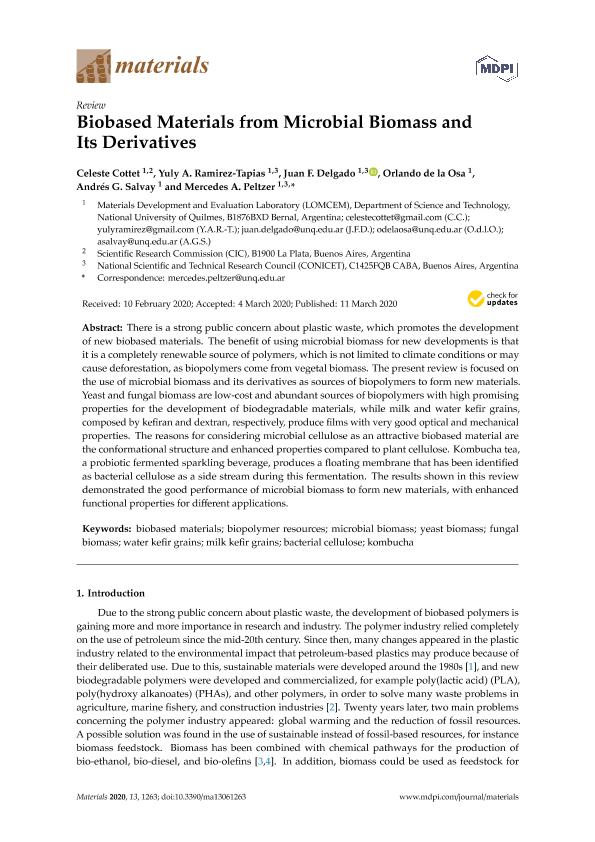Artículo
Biobased materials from microbial biomass and its derivatives
Cottet, Agustina Celeste ; Ramírez Tapias, Yuly Andrea
; Ramírez Tapias, Yuly Andrea ; Delgado, Juan Francisco
; Delgado, Juan Francisco ; de la Osa, Orlando; Salvay, Andrés Gerardo; Peltzer, Mercedes Ana
; de la Osa, Orlando; Salvay, Andrés Gerardo; Peltzer, Mercedes Ana
 ; Ramírez Tapias, Yuly Andrea
; Ramírez Tapias, Yuly Andrea ; Delgado, Juan Francisco
; Delgado, Juan Francisco ; de la Osa, Orlando; Salvay, Andrés Gerardo; Peltzer, Mercedes Ana
; de la Osa, Orlando; Salvay, Andrés Gerardo; Peltzer, Mercedes Ana
Fecha de publicación:
03/2020
Editorial:
Multidisciplinary Digital Publishing Institute
Revista:
Materials
ISSN:
1996-1944
Idioma:
Inglés
Tipo de recurso:
Artículo publicado
Clasificación temática:
Resumen
There is a strong public concern about plastic waste, which promotes the development of new biobased materials. The benefit of using microbial biomass for new developments is that it is a completely renewable source of polymers, which is not limited to climate conditions or may cause deforestation, as biopolymers come from vegetal biomass. The present review is focused on the use of microbial biomass and its derivatives as sources of biopolymers to form new materials. Yeast and fungal biomass are low-cost and abundant sources of biopolymers with high promising properties for the development of biodegradable materials, while milk and water kefir grains, composed by kefiran and dextran, respectively, produce films with very good optical and mechanical properties. The reasons for considering microbial cellulose as an attractive biobased material are the conformational structure and enhanced properties compared to plant cellulose. Kombucha tea, a probiotic fermented sparkling beverage, produces a floating membrane that has been identified as bacterial cellulose as a side stream during this fermentation. The results shown in this review demonstrated the good performance of microbial biomass to form new materials, with enhanced functional properties for different applications.
Archivos asociados
Licencia
Identificadores
Colecciones
Articulos(SEDE CENTRAL)
Articulos de SEDE CENTRAL
Articulos de SEDE CENTRAL
Citación
Cottet, Agustina Celeste; Ramírez Tapias, Yuly Andrea; Delgado, Juan Francisco; de la Osa, Orlando; Salvay, Andrés Gerardo; et al.; Biobased materials from microbial biomass and its derivatives; Multidisciplinary Digital Publishing Institute; Materials; 13; 6; 3-2020; 1-26
Compartir
Altmétricas



